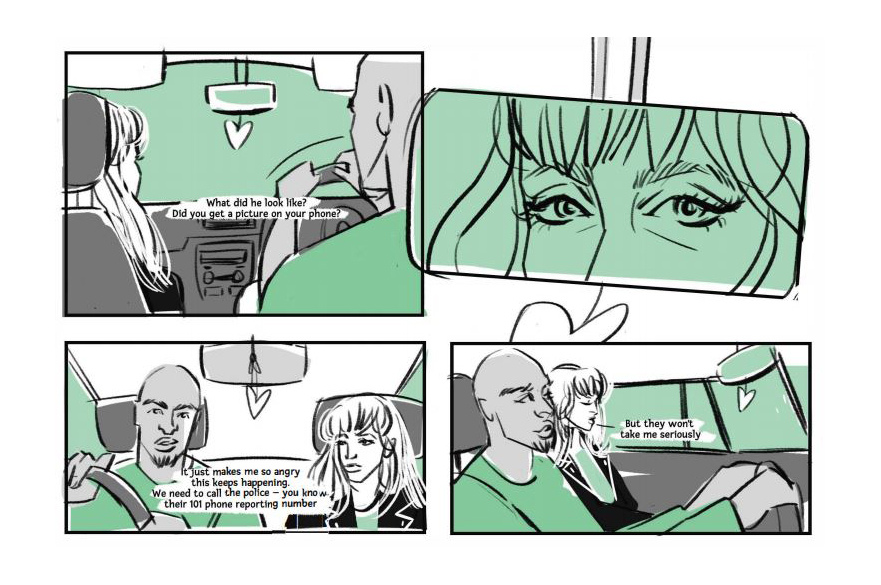Educational resource to tackle street harassment created by misogyny hate crime team
A new resource to teach young people about the impact of street harassment on women and girls has been launched by a team involved in the decision to make misogyny a hate crime in Nottinghamshire.
By Helen Breese | Published on 22 September 2020
Categories: Press office; Research; School of Arts and Humanities; Nottingham Law School;

Changing Minds: The Real Impact of Street Harassment is designed to be used alongside a new comic of the same name, which highlights the deep impact street harassment can have and the importance of tackling peer pressure among men and boys.
The resources have been created by researchers from the University of Nottingham and Nottingham Trent University following their investigation into street harassment in Nottinghamshire. The project considered the impact of the decision by Nottinghamshire Police to start recording offences motivated by misogyny hate crimes. The comic is based on the real-life experiences of the people surveyed by the team about street harassment.
It is hoped that the comic and the recommended activities in the booklet, which bring together adverts, videos, role play, and debate, will particularly encourage men and boys to think about their own behaviour and challenge negativity among their peers.
The three sessions outlined in the pack are linked to the PHSE curriculum for Key Stages 3, 4 and 5 but are designed to be used by any groups of young people including youth clubs, Girl Guiding and Scouts, universities and sports clubs.

It is hoped that the comic and the recommended activities will particularly encourage men and boys to think about their own behaviour Image © Kim Thompson/Dawn of the Unread
Criminologist and expert in hate crime at Nottingham Law School, Associate Professor Loretta Trickett, said: “Our misogyny hate crime research demonstrated what a significant issue street harassment is for many women and girls, with 94% of respondents either experiencing or witnessing street harassment. In addition to this, 75% of the people who experienced street harassment reported that it had a long-term impact on their lives.
“No one should have to change their behaviour because of fear and the comments of others, and we want this resource to really drive home the message that street harassment should be stamped out for good.”
Professor Louise Mullany, a linguistics expert from the University of Nottingham’s School of English, said: “The comic delivers a strong and accessible message. When used alongside the practical resources in the booklet, educators and group leaders will be able to engage young people in serious and impactful discussion on the impact of street harassment and what they can do to prevent it.”
The Nottingham Misogyny Hate Crime work has already influenced police and government policy, including the Upskirting Bill and more recently Associate Professor Loretta Trickett and Professor Louise Mullany advised on the phrasing of the new Domestic Violence Bill currently going through Parliament. The Bill includes an amendment, based on the researchers’ linguistic advice, that will make misogyny a category of hate crime.
The comic strip was created by Nottingham-based graphic art company, Dawn of the Unread, run by NTU School of Art and Humanities' lecturer James Walker, with artist Kim Thompson. It is available online and as a free PDF download. The project was funded by Research England via the University of Nottingham’s Institute for Policy and Engagement in collaboration with Nottingham Citizens.
Notes for Editors
Press enquiries please contact Helen Breese, Public Relations Manager, on telephone +44 (0)115 848 8751, or via email.
About Nottingham Trent University
Nottingham Trent University (NTU) was named University of the Year 2019 in the Guardian University Awards. The award was based on performance and improvement in the Guardian University Guide, retention of students from low-participation areas and attainment of BME students.
NTU was also the Times Higher Education University of the Year 2017, and The Times and Sunday Times Modern University of the Year 2018. These awards recognise NTU for its high levels of student satisfaction, its quality of teaching, its engagement with employers, and its overall student experience.
The university has been rated Gold in the Government’s Teaching Excellence Framework – the highest ranking available.
It is one of the largest UK universities. With nearly 32,000 students and more than 4,000 staff located across four campuses, the University contributes £900m to the UK economy every year. With an international student population of more than 3,000 from around 100 countries, the University prides itself on its global outlook.
The university is passionate about creating opportunities and its extensive outreach programme is designed to enable NTU to be a vehicle for social mobility. NTU is among the UK’s top five recruiters of students from disadvantaged backgrounds and was awarded University of the Year in the UK Social Mobility Awards 2019.
A total of 82% of its graduates go on to graduate entry employment or graduate entry education or training within six months of leaving. Student satisfaction is high: NTU achieved an 87% satisfaction score in the 2020 National Student Survey, above the sector average of 83%.